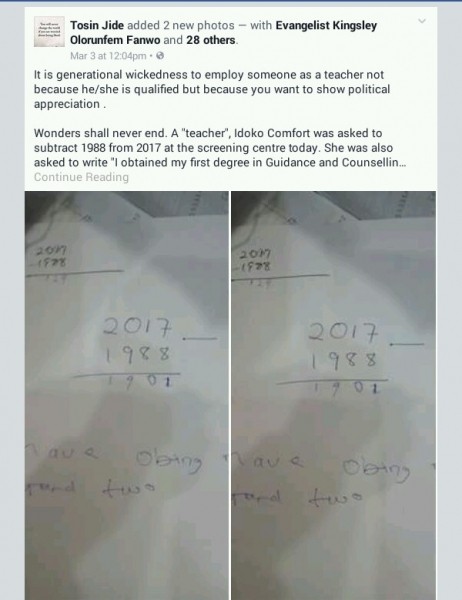
The merging of schools by the Rauf Aregbesola-led government in Osun State is generating mixed reactions from stakeholders, writes FEMI MAKINDE.
The new education policy of Governor Rauf Aregbesola of Osun State, reclassifying schools in the state is receiving kudos from some quarters just as it is receiving knocks from others.
The Christians Association of Nigeria, an umbrella body for all Christian organisations, is at war with the governor over the policy which, it said, was formulated to erase the traces of missionaries who toiled to establish the affected schools.
Although the Aregbesola administration has executed some projects in the education sector which have endeared him to the people of the state, the new policy is brewing controversy.
However, while some people do not see any reason for altering the existing system, the governor and his deputy, Mrs. Titi Laoye-Tomori, have tried to explain the benefits of the reclassification.
The governor, during the inauguration of a new model school at Salvation Army Middle School, Osogbo on Wednesday, said that the merger was one of the recommendations of the Education Summit he organised to reverse the decay he observed in the education sector when he assumed office on November 27, 2010.
He said, “The summit was held against the background of the decay we met in Osun public schools, which we found simply unacceptable. The summit, composed of eminent Nigerians like the Nobel Laureate, Professor Wole Soyinka, came up with a reform blueprint to overhaul public sector education in the state.
“We have since been working assiduously to implement the reform plan. The inauguration of this school is good evidence that all is going according to plan. As part of the reform, we decided to reorganise the school system into elementary, middle and high school categories.
“The elementary level will comprise pupils from ages six to nine years, which corresponds to primary one to four pupils under the existing system. The middle level is from primary four to JSS 3 of ages 10 to 14, now classified as grades 5-9, and the high school level age range will be between 15 and 17 years, corresponding to Senior Secondary School III, to be known as grades 10-12.
“The overall aim of the reforms we are carrying out is to develop the new man intellectually, socially and morally. This new man is placed in the centre of society who views his own development as part of the development of society.’’
While the governor and some others see the good side of the new policy, the Osun State chapter of CAN opposed the merger. The state CAN Chairman, Rev. Elisha Ogundiya, described the policy as a means of erasing whatever missionary legacy is left of any Christian mission school in the state. He stressed that the merger, if successful, would produce new names that would not indicate that the church built the school before government took it over.
Ogundiya, in a letter to the governor, asked him to stop the merger or be ready for “appropriate actions” from Christians.
The letter read, “ However, we observe that the foundation of Christian faith is being threatened by some of the state government policies, especially in the education sector, which the church is strongly averse to and is not ready to compromise.
“Therefore, CAN, on behalf of the entire Christians in the state unanimously resolved that the state government should stop the merger of schools forthwith; reverse the changing of single sex schools to co-educational schools in order to preserve the religious character of each school: return all mission schools to their original founders. Hence, the Christian Association of Nigeria, on behalf of the entire Christians in the State of Osun, is requesting that the state government takes appropriate steps to revert to the status quo within seven days with effect from the dates of receipt of this letter.
“If there is no concrete and sincere step taken before the seven-day ultimatum expires, the Christian Association of Nigeria, Osun State chapter, will take further appropriate actions.”
Senator Iyiola Omisore, who is a governorship aspirant of the Peoples Democratic Party and his counterpart in the Unity Party of Nigeria, Mr. Segun Akinwusi, have also criticised the policy.
Omisore said in a statement, “The merging of schools has created tension in our dear state. In the last few weeks, some Anglican priests and other well-meaning natives have shown their displeasure at the proposed school merger. Instead of the governor allowing the voice of reason to prevail, he has treated all entreaties with disdain.”
Omisore and Akinwusi said that the pupils would now have to trek a long distance from their former schools to get to their new schools. They noted that the policy would lead to the withdrawal of many pupils from schools because of the distance and the extra money their ‘impoverished parents’ would have to cough up for their fares.
The Campaign for Democratic and Workers’ Rights led by Castro Abiona also protested against the plan to scrap Fakunle Comprehensive High School. The group alleged that the state government wanted to build a shopping complex on the premises.
Resumption was almost disrupted as pastors from Osun Baptist Conference led by Christian Education Minister, Rev. Bisi Oluwadamilare, stormed Baptist Girls High School, Osogbo to prevent male pupils from entering the school on Wednesday. The clergymen arrived the school around 6:30am and stood at the gate.
Their presence intimidated the male pupils who had come to resume in the school. However, the police drafted to the school ensured that the male pupils gained entry into it. Some of the pastors initially showed some resistance but the timely intervention of the elderly clerics among them saved the situation.
The clergymen suggested that while bringing female pupils to Baptist Girls High School, male pupils should be taken to St. Charles Grammar School or any of the government – owned schools to avert crisis.
The deputy governor, who is also the commissioner for education, arrived promptly to douse the tension. She pleaded with the clergymen to allow the male pupils into the school for only that day, assuring them that the state government would address the situation.
The Christians also protested against the merging of hijab-wearing pupils with the pupils of Baptist High School, Iwo.
The governor however appealed for understanding from all stakeholders.
A national officer of the All Nigeria Conference of Principals of Secondary Schools in the state, who sees the policy in a different light, described it as a very good policy which, if well implemented, would lead to better performance of pupils in external examinations. The official, who pleaded not to be named, said that the merger would cause pain initially but its advantages would outweigh the initial discomfort.
He said, “We are now sorting the students and teachers out. The students are settling down, some of them have even started lessons. This reclassification is good and I pray it succeeds because it would allow for optimal use of the little resources of the state and the pupils would be better for it.
“The policy will ensure that there are well-equipped laboratories in the schools and other equipment needed for effective teaching and learning. But those implementing the policy must ensure its success before its advantages start manifesting.’’
A former Dean of the Faculty of Agriculture at the Obafemi Awolowo Univesity, Ile Ife, Prof. Olasupo Ladipo, also hailed the merger saying it would enable the state government to equip the schools better.
Ladipo said, “There are too many schools which are not well-equipped. Education is expensive and schools should be well-equipped to enable students have access to quality education.’’

